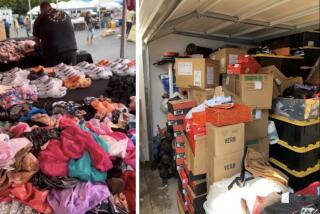Chilean government vows to crack down on ‘tourist burglars’ targeting California
Chile’s government Friday pledged to crack down on Chilean crews suspected of committing hundreds of burglaries in Southern California and across other states.
Traveling bands of so-called tourist burglars from Chile are a growing concern for law enforcement, and Southern California was identified as a hot zone, with scores of cars, businesses and homes targeted for theft.
The Times reported Wednesday that a visa waiver program has helped some Chileans suspected of crimes enter the country.
The Chilean Embassy in Washington issued a statement saying it takes seriously any threat to international security.
“The Ministry of Foreign Affairs of Chile considers that this is a situation of high concern,” the statement said. “In fact, the Representative of the Investigative Police of Chile in Washington is closely monitoring the situation and is in contact with our Consulates and with federal, state and local law enforcement in order to control and prevent reoccurrence of these regrettable events.”
Simi Valley police recently arrested three Chilean men on suspicion of multiple vehicle burglaries. Each was in the U.S. on temporary waivers, police said. In January, four other Chilean men were arrested in connection with 20 home burglaries and other thefts from vehicles at golf courses in the same community.
A crew believed to be connected to a Chilean ring pried into a Laguna Niguel jewelry store last month, swiping more than $1 million in goods.
Similar crimes have been reported in Texas, Arizona, Colorado, New York and other states as well as several European countries, the FBI said.
An official with U.S. Customs and Border Protection, which enforces immigration policies, said the agency is aware of “tourist burglars” and is sharing information with law enforcement.
The ESTA — Electronic System for Travel Authorization — can be used for tourism, business, study or medical purposes for 90 days. The streamlined visa waivers are good for two years and can be used for multiple entries.
The visa waiver doesn’t guarantee entry into the United States, said the official, who requested anonymity because he was not authorized to speak publicly. The determination is made after interviews on U.S. soil. But until an arrest is made, an individual can’t be flagged in a database to block their entry.
“There’s a lot of intelligence going on behind the scenes,” the official said.
Once The Times detailed the crimes this week, headlines popped up across Chile and spread through the Chilean community in Los Angeles.
Ricardo Flores, owner of Rincón Chileno, a Chilean restaurant and delicatessen in East Hollywood and Lawndale, said relatives and friends flooded his phone this week to discuss the series of crimes. Pastries and empanadas fill display cases at the Melrose Avenue eatery, which sports colorful red soccer shirts and Chilean flags hanging on the wall.
He said Chileans visiting the store didn’t know about the burglaries and speculated that the crews are receiving help with travel and living expenses from inside the U.S.
He called for more scrutiny of the waiver program.
“They need to stop this,” he said, grabbing a carne empanada from the case. “This is only the tip of the iceberg.”
The United States annually reviews how often residents from each country violate laws while here. A high number of arrests or violations could damage a country’s eligibility for the waivers, said the U.S. Customs and Border Protection official. Citizens of 38 countries currently qualify for the waivers.
Chileans fear negative perceptions could spread among Americans and law enforcement, especially if a “Chilean gang breaks into the house of an influential figure,” said Boris van der Spek, editor in chief of Chile Today in the capital, Santiago.
“Task forces are now focusing on the nationality instead of the crime,” he said about events in Canada, where the crews have also struck. Last year, Canadian police arrested a gang of 15 Chileans who stole more than $2.7 million in 400 burglaries. “This doesn’t help the image that Chile is trying to sell internationally.”
Carlos Gutierrez, a retired captain with the Chilean national police and professor of forensic sciences at Chaminade University in Honolulu, said the country’s two police agencies aren’t sharing enough information with the FBI.
“This situation is really embarrassing for our country,” he said. “Everybody is concerned.”
Laura Eimiller, an FBI spokeswoman in Los Angeles, said the FBI representative in Chile is working closely with authorities in the country. She declined to comment on how well the Chilean agencies share information.
Although the burglaries have occurred in multiple states and countries, the Chilean Embassy said it doesn’t believe the crimes are as widespread.
The crime patterns emerged in the last year after crews employed inventive techniques to gain entry to properties, such as cutting electricity to a jewelry store in Orange County last month and waiting 24 hours for the alarm system’s batteries to drain.
Last week, Simi Valley police arrested a crew with a jamming device that prevented car owners from locking their vehicles. The tactics didn’t surprise Gutierrez, who noted both had been tried in Chile.
“It’s common,” he said. “These people learn from each other. This is all they do.”
More to Read
Sign up for Essential California
The most important California stories and recommendations in your inbox every morning.
You may occasionally receive promotional content from the Los Angeles Times.











